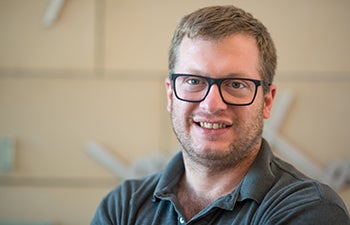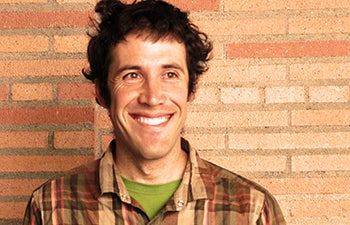Ehrenreich and Ralph Earn Sloan Fellowships
USC Dornsife faculty members Ian Ehrenreich and Peter Ralph have been selected as research fellows for 2015 by the Alfred P. Sloan Foundation.
Ehrenreich and Ralph are among 126 researchers from the United States and Canada, 12 of whom are in their field of computational and evolutionary molecular biology, who will receive the two-year, $50,000 fellowship award that recognizes and supports promising young scientists.
Each year, the award committees review more than 700 nominations, seeking researchers with demonstrated accomplishments, creativity and the potential to become leaders in the scientific community through their contributions to their field, according to the foundation’s website. Since the beginning of the program in 1955, 43 fellows have gone on to win the Nobel Prize and 65 have received the National Medal of Science. Past Sloan Research Fellows have gone on to notable careers and include such intellectual luminaries as physicist Richard Feynman and game theorist John Nash.
“I sincerely appreciate this prestigious award, which reflects not only my own hard work and success, but also the efforts of my research group, mentors and collaborators,” said Ehrenreich, assistant professor of biological sciences. “As a young investigator, sometimes it is difficult for me to know whether I will make a dent in our understanding of the natural world. This award gives me increased confidence in the importance of my lab’s research. We will use the resources associated with this award to try and break new ground in our field.”
Ehrenreich studies the mechanisms that give rise to heritable variation in genetically complex traits, such as height and disease susceptibility. His laboratory largely focuses on using simple model organisms such as brewer’s yeast to elucidate basic genetic principles that may be universally important, but would likely be difficult or impossible to characterize in humans.
“I am particularly interested in complicated genetic effects that involve interactions among many genetic variants or between sets of genetic variants and the environment,” Ehrenreich said. “My group is also beginning to explore how novel phenotypes that have complex genetic bases arise within populations and contribute to evolution.”

Ian Ehrenreich, assistant professor of biological sciences, studies the mechanisms that give rise to heritable variation in genetically complex traits. Photo by Peter Zhaoyu Zhou.
Ralph, assistant professor of biological sciences, also said he was delighted to have been selected as a Sloan Fellow.
“I’m excited to be in the company of so many groundbreaking scientists and mathematicians who have received this award in the past,” he said. “I look forward to continuing work at the interface of genomics, evolutionary theory and mathematics.”
Ralph works on population genetics and evolution, with the overarching goal of learning about history and how evolution works from looking at genomes. His research focuses on geographical models: how to visualize genetic patterns of relatedness on maps, how to build maps from genomes, and how geographic isolation affects the course of evolution.
He is working on using patterns of relatedness between individuals that can be inferred from similarities in their genomes to learn about recent population history.
“We’ve applied this to humans and have seen the effect of large population expansions in Europe in the past 3,000 years reflected in the genomes of modern Europeans,” Ralph said. “Now we are applying this to desert tortoises from California’s Mojave desert to learn how genes flow between different populations of tortoises and how that might be affected by large solar installations.”
Ralph is also working on mathematical models of evolved adaptation to local conditions. On a longer time scale, he is examining how this sort of adaptation can lead to new species.
“Interbreeding holds a species together; but if different regions are separated enough, with sufficiently little gene flow between them, eventually they’ll go their own way,” Ralph said. “This is part of how we’ve ended up with so much diversity in the natural world around us.”

Peter Ralph, assistant professor of biological sciences, works on population genetics, exploring how evolution works from looking at genomes. Photo by Susan Bell.
Ralph said the Sloan Fellowship came at a particularly good time. “I’m building up a new research group, so I might use the fellowship award to hire a researcher to work on the desert tortoise dataset to enable us to better understand their population dynamics.”
The Sloan Foundation was founded in 1934 by Alfred Pritchard Sloan Jr., then-president and CEO of General Motors, with the goal of making grants to support research and education related to science, technology and economic performance, in addition to improving the quality of American life, according to the foundation’s website.
Awarded in eight scientific and technical fields — chemistry, computer science, economics, mathematics, computational and evolutionary molecular biology, neuroscience, ocean sciences, and physics — the Sloan Research Fellowship Program runs in close cooperation with the scientific community. Candidates must be nominated by their fellow scientists and winning fellows are selected by an independent panel of senior scholars on the basis of a candidate’s independent research accomplishments, creativity and potential to become a leader in his or her field.
“The beginning of one’s career is a crucial time in the life of a scientist. Building a lab, attracting funding in an increasingly competitive environment, and securing tenure all depend on doing innovative, original high-quality work and having that work recognized,” said Paul Joskow, president of the foundation. “For more than 50 years the Sloan Foundation has been proud to celebrate the achievements of extraordinary young scientists who are pushing the boundaries of scientific knowledge.”
“Over the years, the Sloan Research Fellowships have become some of the most sought-after fellowships available to early-career scholars,” says Daniel Goroff, vice president of the foundation and director of the Sloan Research Fellowship program. “Becoming a Sloan Research Fellow means joining a long and distinguished tradition of scientific explorers who have gone on to make the most meaningful and significant discoveries.”